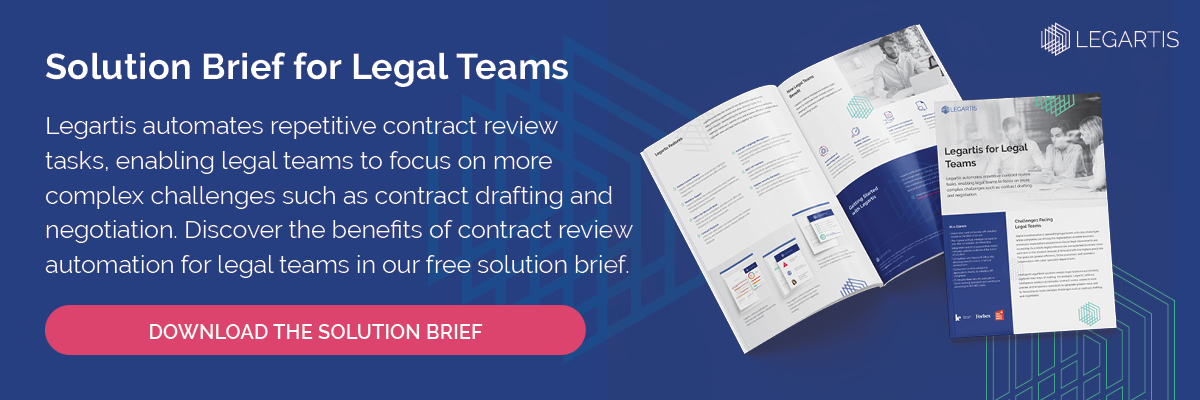In 2018, a study on the introduction of LegalTech in legal departments came to a clear conclusion: Although more than 70% of the lawyers in the companies surveyed considered the use of legal technology to be indispensable, only 3% stated that they used LegalTech strategically or were working with corresponding solutions.
What has changed since then? Unfortunately, not very much.
The legal industry still has a lot of catching up to do when it comes to digitalization. The coronavirus pandemic has caused many departments to experience first-hand the difficulties that arise for workflows when even simple processes are not sufficiently digitalized. Discover here how companies can unleash a great deal of potential through LegalTech and how you can take the first step towards creating a digital legal department today.
Digitalization of the Legal Industry: Driving Change
It’s no longer possible to imagine our working world without digital processes. There’s hardly a sector in which businesses haven’t already embraced digital transformation and are benefiting from the optimization and increased efficiency of process flows and value chains.
So, what is the situation in legal departments? According to a global Gartner survey of legal leaders, 54% still lack a holistic strategy for implementing digital transformation. This is despite the fact that working digitally, i.e. optimizing workflows through intelligent automation, is long overdue. The reasons are as follows:
Complexity is growing and requirements can increasingly only be met digitally
Given the high demands on quality in the light of increasingly complex regulatory challenges and growing capacity constraints, it’s becoming more and more challenging for legal departments to meet rising business demands.
This can only be countered by using technology. Intelligent LegalTech solutions can automate simple tasks wherever possible, leaving employees with more time to devote to other more important issues. In turn, this boosts the efficiency and productivity of the entire organization.
Lack of digitalization strategy affects collaboration with other departments
Increasing digitalization enables more efficient work and faster processes. At the same time, speed and efficiency are becoming increasingly crucial for ensuring seamless collaboration with specialist departments. This is why the top priorities for legal teams in the coming years are improved collaboration with other specialist departments in the company, making data-driven decisions, and providing more effective support for the company’s business strategy.
However, today’s legal teams can only achieve these goals by embracing an effective digitalization strategy. Digital organizational structures are paramount if you want to enjoy seamless collaboration with procurement and sales teams. What’s more, to meet the evolving expectations of internal and external customers, legal departments should modernize their workflows using intelligent solutions.
The pandemic highlights shortcomings when it comes to legal teams working digitally
The digital transformation of work processes has long been on the priority list of legal executives. The coronavirus crisis has demonstrated how urgent optimizing service deployment really is in the legal industry. 44% of leaders surveyed by Gartner said that the remote work culture caused in part by the pandemic has made collaboration difficult.
As a result of the pandemic, the need to work in an almost exclusively remote manner quickly became a reality for many legal professionals. Never has it been more apparent how imperative it is to digitalize, and never have the opportunities presented by the use of LegalTech been greater for legal teams.
LegalTech Bridges the Gap to Innovation
Legal departments are on the verge of fundamental change. To ensure that the vision of making better and faster legal decisions becomes a reality, legal teams must break away from conventional, latently inefficient structures and start automating simple analog processes.
For many, LegalTech is still an unknown term and is often equated with digitalization in the legal world. In concrete terms, however, it refers to the use of technological innovations to boost productivity and compliance in the legal industry.
Definition: LegalTech
LegalTech is short for legal technology and refers to technologies used in the legal industry. The spectrum is broad and includes software applications that automate complete work processes driven by artificial intelligence.
Source: Based on the LegalTech definition by Haufe
The vast majority of legal professionals have already recognized the potential of LegalTech for their department. According to Wolters Kluwer’s “Future Ready Lawyer” study, 83% of lawyers expect to increasingly use technology to drive productivity in the future. However, only a few are using such technologies today, with a mere 28% saying their organization is very well prepared to respond to the growing influence of LegalTech.
However, the first step towards a digital legal department doesn’t have to be complicated. We’ll show you how your legal team can meet the high need for productivity, speed and efficiency with the right LegalTech solution.
The First Step to Digitalize Can Be Quite Simple
Integrating LegalTech into the legal industry’s workflows doesn’t mean changing the entire organizational structure or having your team adapt to completely new workflows. On the contrary, automation and artificial intelligence come into play where inefficiencies and errors occur. With the right LegalTech solution, employees are relieved of time-consuming tasks, which frees up capacity and minimizes the risk of errors.
Let’s look at one of the core tasks in legal departments: contract review. This is an area in which requirements are constantly growing. Legal professionals are expected to review increasingly complex contracts in the shortest amount of time and with the highest precision. Legartis’ LegalTech solution supports legal teams with automated contract review.
This potential is unleashed by AI-supported contract review in your legal department and beyond:
- Improved efficiency: Legartis’ artificial intelligence automates the review of non-disclosure agreements, order processing agreements and other contract types, speeding up contract review with increased accuracy.
- Greater added value: repetitive contract review tasks are automated, enabling legal professionals to focus on more complex contract drafting and negotiation challenges.
- Better collaboration with other specialist departments: standardizing the contract review process ensures seamless handovers, reduces sources of error and enables efficient collaboration between the legal team and other specialist departments.
- Reduced operational risk: company policies and standard contract clauses are defined for each contract. This standardizes the contract review process and minimizes the risk of errors, enabling you to consistently negotiate better contracts across all departments.
- Seamless integration without lengthy onboarding and complicated training: Legartis’ artificial intelligence is pre-trained and ready to use after 30 minutes of onboarding. The integrated Contract Playbook, which makes company policies available at the touch of a button, is compatible with Microsoft Office 365, meaning users can continue to work in their familiar environment.
How can legal teams get started with digitalization now? Reap the benefits of LegalTech in the areas where tedious processes can be optimized through intelligent and user-friendly applications, such as in contract review. This enables you to automate simple work steps, boost the efficiency of the entire department and improve collaboration with sales and procurement teams.
Discover the full potential of Legartis. Request a demo now.




